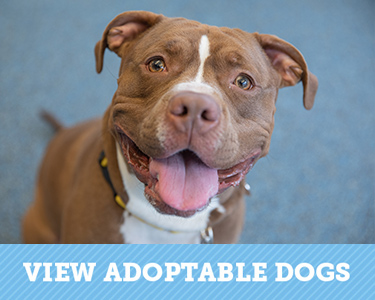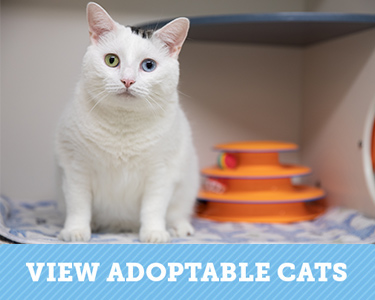
Shelter Collaboration
Our Work
Latest News
The ASPCA believes every animal deserves to live a life free from suffering. For more than 150 years, we’ve been on the frontlines to save, transform, and protect millions of lives in the fight against animal cruelty. As the nation’s first and leading animal welfare organization, we surround the most critical issues from every angle including tackling the most challenging cases in the most challenging places. Our teams of experts work tirelessly to develop innovative solutions that improve the welfare of animals big and small. Through our hands-on work and in collaboration with local partners nationwide, our collective impact is multiplied to give as many vulnerable animals as possible the second chance they deserve. We are the voice for thousands of animals nationwide and our commitment to eliminating animal cruelty is unwavering. Until we create the permanent change that ensures all animals are treated with respect and kindness, our work to protect them will never stop.
Supporting Communities Across the Nation
Relocation Program

The ASPCA is the largest transporter of shelter dogs and cats for adoption in the U.S., partnering with shelters and rescues across 40 states to move more than 20,000 animals annually from shelters in areas of high homeless pet overpopulation to “destination” shelters, where there is a higher demand for adoptable animals. The Relocation Program also helps shelters create and strengthen programs that will have a long-term effect on animal welfare in the surrounding community.
"Oktibbeha County Humane Society is grateful for our collaboration with the ASPCA and their network of destination shelters and waystations which enables our collective of more than a dozen overcrowded local shelters and rescues in Northern Mississippi to safely move thousands of animals closer to loving homes each year,” said Michele Anderson, Board Member at OCHS. “The ASPCA Relocation Program offers immediate, positive impact for the animals moved while also providing critical support to help us create and strengthen programs that are creating long-term, beneficial effects in our community and throughout the region.”
Equine

The ASPCA is committed to ensuring good welfare for all equines in the U.S. We build programs that support horses and their owners, including:
- The ASPCA Right Horse program: With a goal to massively increase horse adoption, the program elevates and advances the work of equine adoption organizations and supporters nationwide while simultaneously building the demand for adoptable horses. As a result, more horses are finding adoptive homes each year, allowing the rescue community to help more at-risk horses.
- Equine Transition and Adoption Center: The ASPCA operates the only equine shelter dedicated specifically to supporting the most at-risk horses, those deemed “harder to adopt” due to age, medical challenges, behavioral issues, or a combination thereof, and creating best practices to advance the equine sheltering field in this area.
"West Virginia Horse Network, Inc. is tremendously grateful to the ASPCA for grant dollars that allowed our organization to respond to the needs of our community and provide safety net services that help keep horses safely in their homes,” said Nicky Walters, founder of West Virginia Horse Network, Inc. “We have been able to make a tremendous impact by diverting horses from coming into the rescue and keeping more spaces open for horses who needed to come under our umbrella. The investment in this vision by the ASPCA has impacted animals and people directly but it has also helped us and others work outside of the box and be more effective and efficient in the mission we all share to make life better for horses.”
Shelter Medicine Services

The ASPCA Shelter Medicine Services department works directly with shelters across the country to improve the health and welfare of homeless animals in communities by strengthening local shelter medicine programs and providing remote and on-site consultations. By offering expertise on infectious diseases, sanitation, population management, and shelter functionality, we’re able to strategically maximize our influence at the local level. The team’s work has impacted almost 500,000 animals since 2022.
Northern Tier Shelter Initiative

The Northern Tier Shelter Initiative (NTSI) is an ASPCA program that provides funding, free consultations and training to shelters, non-profit veterinary clinics, and Indigenous communities in Alaska, Washington, Idaho, Montana, North Dakota, Minnesota, and Wisconsin to improve the quality of life for vulnerable cats and dogs. In 2023, the ASPCA supported and provided vital resources to 167 local organizations in this region.
Behavioral Rehabilitation Center

The ASPCA Behavioral Rehabilitation Center in North Carolina is dedicated to rehabilitating fearful, undersocialized dogs from ASPCA cruelty cases as well as those from other animal welfare organizations. The intensive program is designed to reduce dogs’ anxiety, improve their well-being, and prepare them for adoptive homes by way of our partner shelters.
Additionally, we help partner organizations elevate their own shelter behavior programs. Our expert staff serve as advisors to the development and delivery of interactive educational programs for shelters nationwide to maximize the impact of our work for some of the nation’s most vulnerable animals.
Rescue Work and Field Deployments

The ASPCA responds to cases of animal cruelty, neglect, and natural disasters, assisting thousands of animals each year in dangerous situations, bringing them to safety and helping them heal. When local shelters and agencies request our help rescuing animals in need, not only is the ASPCA able to provide boots-on-ground resources to remove animals in crisis, transport them to safety, and offer temporary shelter where we provide needed medical and behavioral care, but we also help our partners prepare the strongest cases possible through investigative support, crime scene processing and evidence collection, forensic exams, and ongoing legal assistance.
Training and Resources

Our formalized education and training programs equip animal behavior, shelter and veterinary professionals with the tools, practices, and guidance they need to give animals the best chances to live happy, healthy lives in loving homes. As a leader in animal welfare, we deliver this essential knowledge and assistance to organizations that lack funding and resources at the local level to save more animal lives.
- Training: The ASPCA Learning Lab is an interactive, educational program developed to share learnings on science-based behavioral care with animal welfare professionals across the country. Since its inception in 2018, the Learning Lab has attracted more than 28,000 enrollments in virtual and in-person educational opportunities, reaching animal welfare professionals, volunteers, and students from over 1,200 organizations around the world
- Research: The ASPCA leads important studies of its direct-care and community-based programs and collaborates with partner agencies on assessing lifesaving models nationwide. An important part of this research effort is sharing results with the larger animal welfare field to improve the lives of animals and the people who care for them.
- Grants: We grant to nearly 400 organizations annually, and in the last five years have given nearly $57 million to more than 900 organizations in every state of the country (plus DC, Puerto Rico, and the Virgin Islands). Since 2001, we have provided more than $200 million in support to over 3,500 animal shelters, municipal and governmental agencies, rescue groups, and other mission-aligned organizations and programs nationwide.
"Collaboration and expertise are core value for Columbus Humane and we are grateful for the mutually beneficial partnership we have with the ASPCA," said Columbus Humane CEO Rachel Finney. "Because of our work together, Columbus Humane staff have access to training and development opportunities and we're able to assist their team with adoption and veterinary services. The animals, organizations and community all benefit and that's a big win."

